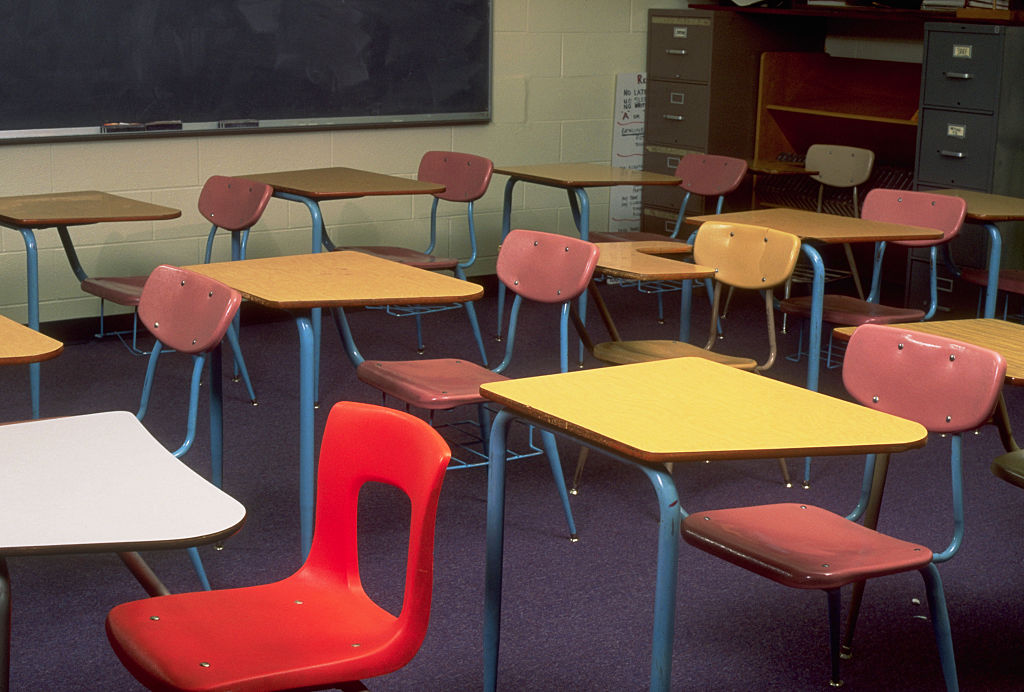
Source: Jeffry Myers / Getty
Here’s a question: What if conservatives are lying about the negative impact learning about racism in class has on their children?
What if white parents are really just projecting their own racial resentment onto their children when they’re filling the school board room meetings to complain about the psychological damage done to their kids after they heard the words “systemic racism” or white privilege?” After all, when Republican legislators are making bold claims that critical race theory teaches white students that they’re inherently racist and to hate their country—which CRT absolutley doesn’t teach—it’s not like they ever provide any studies or any evidence at all that indicates said students actually feel that way. On the other hand, there are numerous studies that show both students and educators alike benefit greatly from anti-racist curricula in terms of racial awareness and academic prowess.
On Monday, researchers from North Carolina State University, Duke University and Dickinson College published a study that undermines the white-and-fragile notion that in-class discussions aimed at anti-racist intervention increase stress among high school students or cause them to feel racially alienated.
First, let’s get into how the study was conducted. From Phys.org:
For the study, researchers from NC State, Duke University, and Dickinson College worked in partnership with a public high school to assess the impact of a classroom intervention aimed at helping students understand and discuss issues related to racism. The intervention was conducted for 45 minutes once a week for 10 weeks.
Specifically, the researchers did an assessment of 227 students before the intervention and three months after the intervention, aimed at capturing how engaged students were, how students related with staff, the extent to which students felt that they belonged in the school community, student stress, and the extent to which students perceived social inequality.
In addition, 67 of the study participants also completed daily surveys for three weeks during the intervention. These surveys were designed to capture daily fluctuations in each student’s stress levels and feelings of belonging.
“One of the key findings was that 60% of study participants reported being highly engaged with the intervention, and another 20% were passively/somewhat engaged,” Jackie Cerda-Smith, a Ph.D. student at NC State, said.
Kelly Lynn Mulvey, an associate professor of psychology at NC State, reported that “students in our study were actively interested in learning about and discussing issues related to racism,” and that “the highly engaged group demonstrated significant growth in their awareness of social inequality after the intervention.”
“We also found that there was no increase in stress or decrease in feelings of belonging” on days when students were involved in the anti-racism intervention,” Mulvey says. “That was true for all 67 participants who did daily surveys, regardless of how engaged they were in the intervention.”
Whaaaaah? But how could this be? To let the Ron DeSantises, Marjorie Taylor Greenes and Greg Abbotts of the world tell it, anti-racism studies in the classroom are causing woke paralysis in unsuspecting Caucasian students while Black kids are learning to give up on themselves because the world is so damn racist. Wouldn’t it be a wild turn of events if it turned out these teenagers aren’t the fragile, delusional and racially indignant DEI-haters many of their parents are and they actually seek or already have a healthy understanding of racial dynamics in America and beyond?
“Young people are aware of racial injustice and related social issues, and schools are interested in helping students understand racial justice and develop the tools they need to discuss these issues in a meaningful way,” Mulvey said. “There are multiple programs that aim to help schools accomplish these goals. In this study, we wanted to determine how effective one such program was. Did it help students understand racial justice issues? Did it make them more comfortable talking about these issues? Were there any unintended effects on the students?”
Apparently, the answers to all of those questions were a resounding “yes,” and the experiment didn’t only benefit students, but educators as well.
“Based on what we learned here and on our interactions with the educators at this school, this study also underscores the value of partnerships between educators and the research community,” Cerda-Smith said. “We were able to capture real-world data on how students are responding to anti-racist interventions, which expands our understanding of this subject and gives teachers insights into their students. Hopefully, this will encourage more researchers and educators to pursue partnerships like this one.”
And there you have it.
SEE ALSO:
Adrianne Todman Named Acting HUD Secretary After Marcia Fudge Announces Resignation
The post Study Finds No Increase In Stress Among High School Students Who Participated In Anti-Racism Program appeared first on NewsOne.
Study Finds No Increase In Stress Among High School Students Who Participated In Anti-Racism Program was originally published on newsone.com
















